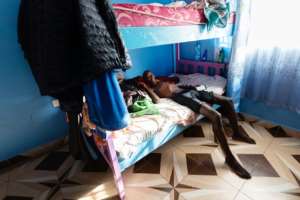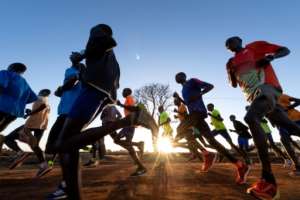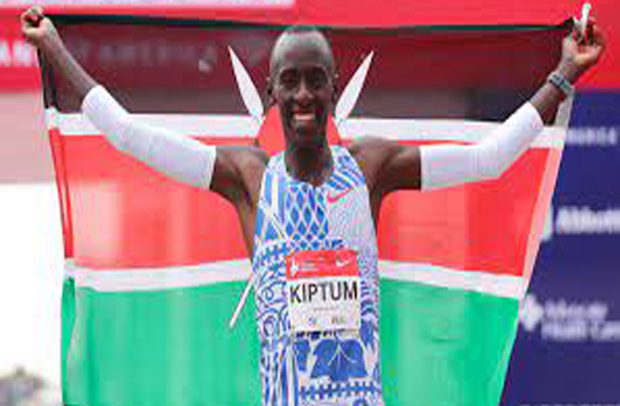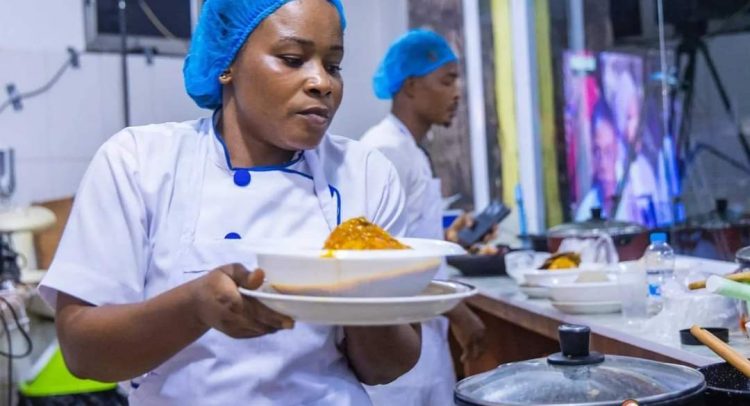
As dawn breaks high in Kenya's Rift Valley, car headlights pick out groups of elite athletes, mere silhouettes on roadsides as their grinding daily training routine gets under way.
Coach Lawrence Saina, himself a sub-2hr 10min marathon runner in his day, oversees nine of his Kenyan proteges, sending them out on a 40-kilometre (25-mile) run.
Hitting the tarmac under a wan rising sun, the athletes take advantage of the cardiovascular benefits from training at an altitude of 2,500 metres (8,200ft), which boosts oxygen-carrying red blood cells.
"Today, it won't be quick," said Saina, his charges still clocking mind-boggling speeds of 3min 42sec per kilometre, far removed from the average runner.
These are, after all, elite athletes: among the nine breaking sweat in the cool morning are Saina's younger brother Emmanuel, fourth in the Dubai marathon in January in 2hr 05min 02sec. He is due to race over the 42km distance in Rotterdam on Sunday.
After an hour the group head off the road into fragrant tea plantations, the breaking dawn sun finally lighting up the rock-strewn, and at times treacherous, red soil underfoot.
"When we go out for more than 35km in the morning, we don't do anything in the afternoon," said Saina of his training squad who live all year round, apart from when they go abroad for competitions, in Iten.
Bedrooms are shared, with two or four beds in each. There is a living area, kitchen and a rubdown room with two full-time physios working flat out to keep the demands of 20 elite runners in check.
There are dozens of similar camps up and down the Rift Valley, and they have churned out some of the best distance runners the world has ever seen.
One of those is Paul Lonyangata, who is aiming to become the first three-time winner of the Paris Marathon when he takes to the streets of the French capital on April 14.
The 26-year-old's path to the peak of long-distance running has not been without its bumps.
'A very long story'
"My story is a very long story," said Lonyangata, who is based in Kaptagat, along with marathon world record holder and Olympic champion Eliud Kipchoge.
 Living conditions in the training camps are spartan. By FRANCK FIFE (AFP)
Living conditions in the training camps are spartan. By FRANCK FIFE (AFP) The second of five children, Lonyangata was born in December 1992 in Pokot, in northwest Kenya. When he was nine, his elder sister was killed, aged 12, in a tribal dispute.
The conflict was serious enough to force Lonyangata's family to flee to neighbouring Uganda for three years before returning.
Lonyangata himself only took to the track when he started secondary school in 2005 in Kapcherop.
Up until that point, he had walked -- often great distances -- in the absence of not only access to a car but also a road.
"From my home to my school, it was very far. About 15km from one place to another. Every day 30km for sure, for six days of the week."
His first victory, in an 8km cross-country came in 2006 in Eldoret, quickly followed by an international high school cross-country race in Seattle after which he was given two million Kenyan shillings ($22,450, 20,000 euros) by a sponsor.
It was not until 2009, with his schooling behind him, that he launched himself full time into athletics, winning bronze in the 10,000m at the world junior championships in Moncton, Canada, a year later.
Twelve months later, he was signed up to one of Italian agent Federico Rosa's Kaptagat training camps. The camp is led by James Kwambai, who clocked a marathon best of 2:04:27 in Rotterdam in 2009 and is currently Lonyangata's coach.
Target Bekele's Paris record
Lonyangata has a personal best of 2:06:20 set when racing to victory in the Paris Marathon in 2017 when his ex-wife Purity Rionoripo famously won the women's race.
And he has one thing on his mind: "I need to come this time to run a course record."
His training mate Cosmas Kiplimo Lagat will act as pacemaker as Lonyangata targets Ethiopian Kenenisa Bekele's Paris record of 2:05:03, set in 2014.
Kenya's long-distance running success and its Rift Valley training camps have attracted foreign athletes keen to benefit from altitude training alongside top-drawer rivals.
 The altitude and the high level of training has attracted elite runners from around the world to the Kenyan camps. By FRANCK FIFE (AFP)
The altitude and the high level of training has attracted elite runners from around the world to the Kenyan camps. By FRANCK FIFE (AFP) While foreigners are not housed in the same camps as the Kenyans, the two parties mix in training, meaning that the group of runners setting out on a run can number up to 100.
Among them is Swiss runner Julien Wanders, who set a new European half-marathon record of 59:13 in February, smashing the previous best set by Britain's multi-medalled Mo Farah, another athlete who has spent time training around Iten, notably when he made the switch to marathon racing.
Wanders has been coming to Iten since 2016 and is in no doubt about the benefits: "The altitude helps and there is undulating terrain," he said.
And the level of his training partners is a major factor too.
"The level is very high, you'd never find that in Europe," he concedes.
Read Full Story





















Facebook
Twitter
Pinterest
Instagram
Google+
YouTube
LinkedIn
RSS